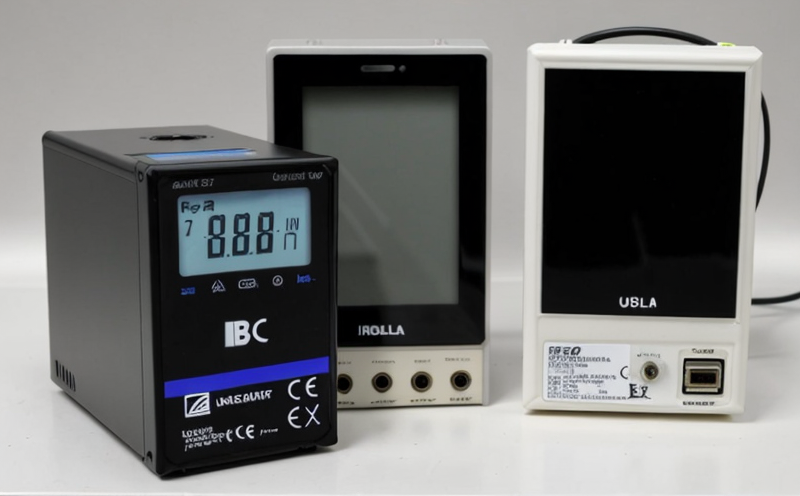UL 2271 Consumer Electronics Light Device Battery Testing
The UL 2271 standard is a critical benchmark for ensuring the safety and reliability of consumer electronics light devices, particularly those that incorporate rechargeable batteries. This standard is especially important in sectors where portable lighting solutions are essential, such as emergency equipment, outdoor gear, and wearable technology.
UL 2271 addresses various aspects of battery performance and durability, including overcharge protection, short-circuit protection, and thermal management. By adhering to this standard, manufacturers can ensure that their products meet stringent safety requirements, thereby reducing the risk of fire hazards or other dangerous incidents.
The UL 2271 testing protocol involves multiple phases aimed at evaluating different aspects of battery performance. Initially, specimens undergo a series of charge and discharge cycles under controlled conditions to assess capacity retention and durability. This is followed by thermal stability tests to ensure that the batteries can withstand extreme temperatures without compromising safety.
A significant aspect of UL 2271 testing involves the evaluation of protection mechanisms such as overcharge, over-discharge, and short-circuit protections. These mechanisms are crucial for preventing damage to the battery or potential hazards from misuse. The tests also include a comprehensive set of abuse conditions designed to simulate real-world scenarios where batteries might be exposed to mechanical stress or environmental factors.
The UL 2271 standard ensures that light devices meet stringent safety criteria, which is essential for consumer electronics in sectors like outdoor recreation and emergency preparedness. Compliance with this standard not only enhances product reliability but also helps manufacturers meet regulatory requirements, thereby gaining a competitive edge in the market.
For R&D engineers and compliance officers, UL 2271 testing provides critical insights into how to design and manufacture safer products. By understanding the specific requirements outlined in this standard, quality managers can ensure that their teams are equipped with the necessary tools and knowledge to meet these stringent safety benchmarks.
The testing process is meticulous and involves rigorous procedures designed to identify potential weaknesses in battery performance and durability. This ensures that consumer electronics light devices not only function as intended but also provide a safe experience for users, thereby enhancing overall product reliability and user trust.
Why It Matters
The importance of UL 2271 testing cannot be overstated in the context of consumer electronics light devices. By adhering to this standard, manufacturers can ensure that their products not only meet but exceed safety and performance expectations. This is particularly crucial given the increasing complexity of battery technology and the demand for safer, more reliable portable lighting solutions.
The UL 2271 standard addresses a range of critical issues, including overcharge protection, short-circuit protection, and thermal stability. These aspects are essential for preventing fires and other hazards that could arise from improper use or exposure to adverse conditions. The testing process is designed to simulate real-world scenarios, ensuring that batteries perform reliably under various stressors.
The standard's emphasis on protection mechanisms underscores the importance of robust design in consumer electronics light devices. By incorporating overcharge, over-discharge, and short-circuit protections, manufacturers can significantly reduce the risk of battery failure or potential hazards. This not only enhances product safety but also builds user confidence, which is vital in a competitive market.
Compliance with UL 2271 testing provides manufacturers with a clear pathway to achieve regulatory compliance and gain recognition from key industry stakeholders. This can be particularly beneficial for quality managers and procurement teams, as it ensures that products meet stringent safety criteria. Moreover, adherence to this standard helps companies differentiate their offerings in the market, thereby enhancing brand reputation and consumer trust.
The broader implications of UL 2271 testing extend beyond individual products, influencing industry standards and practices. By setting a high bar for battery performance and durability, this standard encourages innovation and continuous improvement across the sector. This, in turn, contributes to the development of safer, more reliable consumer electronics light devices that meet the evolving needs of users.
Applied Standards
| Standard | Description |
|---|---|
| UL 2271 | Rechargeable batteries used in consumer electronics light devices. |
| American National Standards Institute (ANSI) Z540.1 | International standard for the requirements for the measurement, testing, and appraisal of product characteristics. |
International Acceptance and Recognition
The UL 2271 standard enjoys widespread recognition and acceptance across various markets. Its stringent requirements have made it a benchmark for the design, manufacturing, and testing of consumer electronics light devices worldwide. Many countries and regions have adopted this standard as part of their regulatory frameworks, recognizing its role in ensuring product safety and reliability.
Manufacturers that comply with UL 2271 not only meet domestic requirements but also open doors to international markets. This global acceptance enhances brand reputation and market accessibility, providing a competitive advantage in the industry. Compliance with this standard is particularly beneficial for companies operating across multiple jurisdictions, as it ensures consistent product quality and safety standards.
The recognition of UL 2271 extends beyond regulatory compliance; it also reflects a commitment to innovation and excellence. By adhering to this standard, manufacturers demonstrate their dedication to delivering high-quality products that meet the highest safety and performance benchmarks. This commitment is crucial for maintaining consumer trust and fostering long-term relationships with stakeholders.
The acceptance of UL 2271 in international markets underscores its role in promoting global standards for product design and manufacturing. By ensuring that batteries used in consumer electronics light devices meet stringent safety criteria, this standard contributes to the overall improvement of industry practices worldwide. This alignment with international standards not only enhances market access but also fosters a culture of continuous improvement and excellence.





